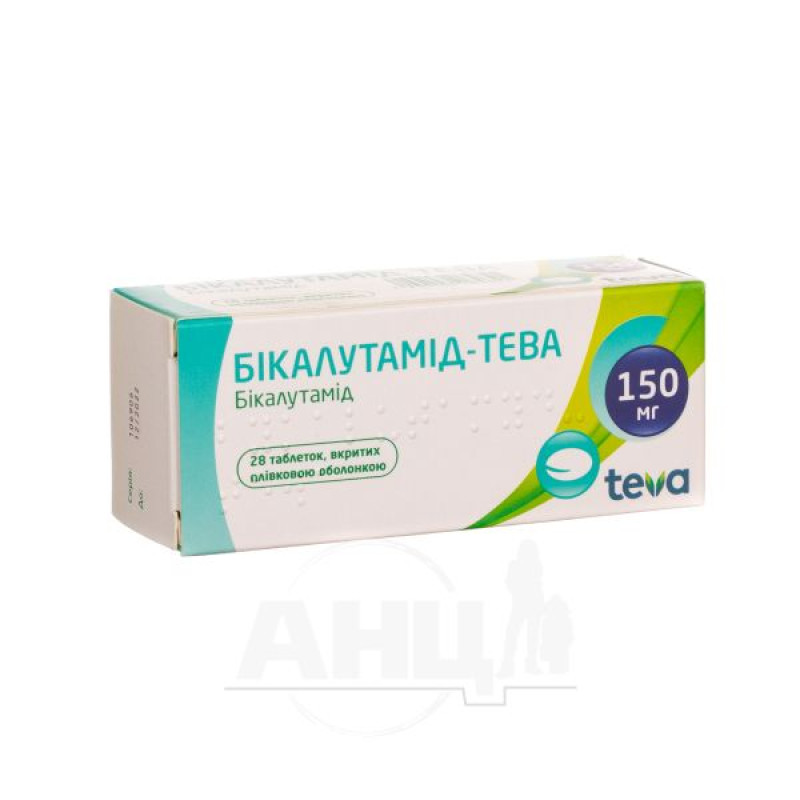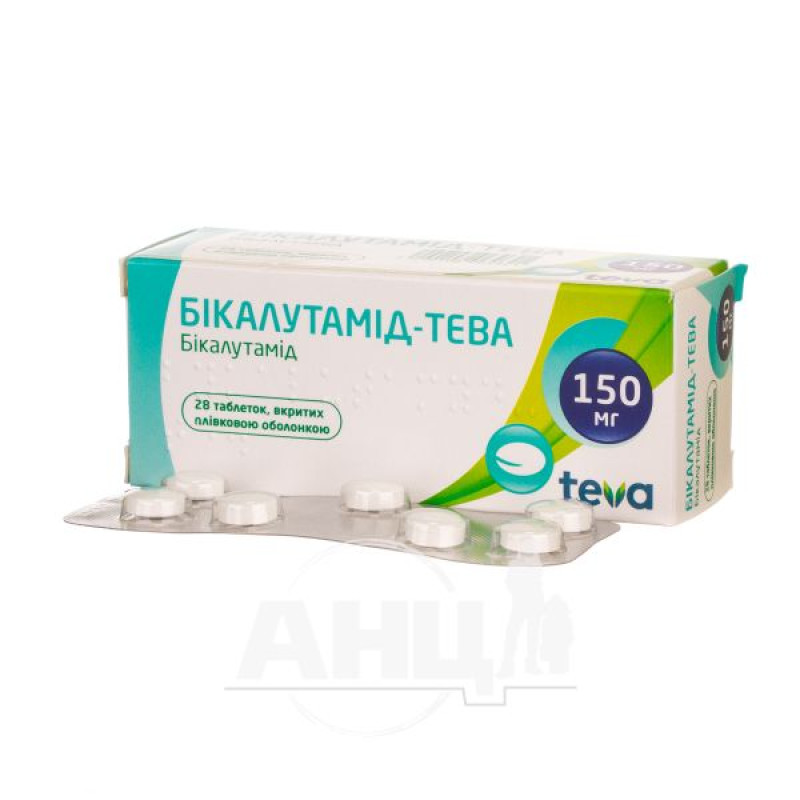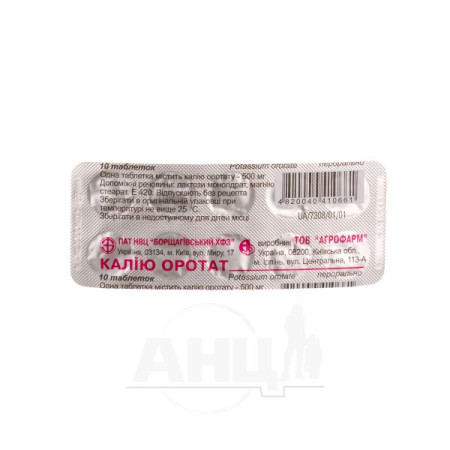Bicalutamide-Teva film-coated tablets 150 mg No. 28

Pharmacological properties
Pharmacodynamics. Bicalutamide-Teva is a nonsteroidal antiandrogen that does not have other endocrine activity. Bicalutamide binds to androgen receptors without activating gene expression, thereby inhibiting androgen activity. This leads to regression of the prostate tumor. In some patients, discontinuation of bicalutamide therapy may cause withdrawal syndrome.
Bicalutamide-Teva is a racemic compound; only the (R)-enantiomer exhibits antiandrogenic activity.
Pharmacokinetics. Bicalutamide-Teva is well absorbed after oral administration. Food intake does not affect bioavailability.
Compared to the (R)-enantiomer, the (S)-enantiomer is rapidly excreted from the body, with the T½ of the former being about 1 week.
With daily administration of bicalutamide, the concentration of the (R)-enantiomer in blood plasma increases 10-fold as a result of a prolonged T½.
With daily administration of bicalutamide, the concentration of the (R)-enantiomer in blood plasma at saturation is about 22 mg/ml. At the same time, the (R)-enantiomer accounts for 99% of the total number of circulating enantiomers at saturation.
The pharmacokinetics of the (R)-enantiomer are not affected by age, renal insufficiency, or mild to moderate hepatic insufficiency. In severe hepatic insufficiency, the (R)-enantiomer is eliminated from the blood plasma more slowly.
Bicalutamide binds to plasma proteins (racemized - 96%; (R) -enantiomer - 99%) and undergoes extensive metabolism (by oxidation and glucuronidation); metabolites are excreted by the kidneys and with bile in approximately equal proportions.
Indication
Bicalutamide-Teva 50 mg: treatment of metastatic prostate carcinoma in combination with a luteinizing hormone-releasing factor (LH-R) analogue or surgical castration.
Bicalutamide-Teva 150 mg: locally advanced prostate cancer as monotherapy or adjuvant therapy in combination with radical prostatectomy or radiotherapy.
Application
Adult men, including the elderly: 1 tablet once a day at the same time (morning or evening). Bicalutamide-Teva 150 mg is taken for at least 2 years.
Treatment is started simultaneously with the administration of an RF-LH analogue or with surgical castration.
Renal failure: No dose adjustment is required.
Liver disease. No dose adjustment is required for mild liver disease. Cumulation is possible in moderate and severe liver disease.
Contraindication
Hypersensitivity to bicalutamide and other components of the drug;
childhood;
severe liver dysfunction;
concomitant treatment with terfenadine, astemizole or cisapride.
Side effects
During clinical trials with the simultaneous use of bicalutamide and an rf-lg analogue, side effects are classified by organ system and frequency of occurrence: very common (1/10); common (1/100, 1/10); uncommon (1/1000, 1/100); rare (1/10,000, 1/1000); sometimes (1/10,000).
Immune system: uncommon - allergic reactions (hypersensitivity), including angioedema and urticaria.
Mental disorders: infrequently - depression.
Respiratory system: infrequently - interstitial pneumonia, shortness of breath.
Gastrointestinal tract: often - nausea, diarrhea, constipation; infrequently - dry mouth, dyspepsia, flatulence; rarely - vomiting.
Hepatobiliary system: often - increased transaminase levels, cholestasis, jaundice; sometimes - liver failure.
Skin and subcutaneous tissue: often - rash, hyperhidrosis, hirsutism; rarely - dry skin; sometimes - alopecia.
Kidneys and urinary system: infrequently - hematuria, nocturia.
Reproductive system and breast: very often - breast tenderness, gynecomastia; sometimes - erectile dysfunction, impotence.
Blood and lymphatic system: very often - thrombocytopenia; often - anemia.
Metabolism: infrequently - anorexia, hyperglycemia, weight loss; rarely - diabetes mellitus, weight gain.
Nervous system: very often - decreased libido; often - dizziness, insomnia; rarely - drowsiness.
Cardiovascular system: sometimes - heart failure, angina pectoris.
General disorders: very often - hot flashes, feeling of heat; often - asthenia, itching, swelling, pelvic pain, chills; infrequently - abdominal pain, headache, pain in the chest, neck, lumbar region.
Special instructions
Bicalutamide is extensively metabolized in the liver. In patients with severe hepatic impairment, the elimination of the drug may be delayed, which may lead to accumulation of bicalutamide. Therefore, bicalutamide should be used with caution in patients with moderate liver disease.
It is recommended to monitor liver function (at least once a month). Most liver function abnormalities are observed in the first 6 months of treatment with bicalutamide.
If severe liver dysfunction occurs during the use of bicalutamide, treatment with the drug should be discontinued.
Bicalutamide is an inhibitor of cytochrome P450 - CYP 3A4, therefore caution should be exercised when using the drug simultaneously with drugs that are metabolized by CYP 3A4.
The drug contains lactose monohydrate. Patients with hereditary lactose intolerance, Lapp lactase deficiency, glucose-galactose malabsorption are not recommended to use this drug.
Pregnancy and breastfeeding. The drug is used exclusively for the treatment of men.
Ability to influence the reaction rate when driving vehicles or working with other mechanisms. During the period of treatment with the drug, you should refrain from driving vehicles and working with other mechanisms.
Interactions
The simultaneous use of bicalutamide with terfenadine, astemizole, cisapride and cyclosporine is contraindicated. Caution should be exercised when using cyclosporine and calcium channel blockers simultaneously. A dose reduction may be required if side effects occur. It is necessary to frequently and regularly monitor the level of bicalutamide in the blood plasma and the clinical condition of patients at the beginning and after discontinuation of treatment. Caution should also be exercised when using drugs that can inhibit the oxidation of bicalutamide (ketoconazole, cimetidine). This may lead to an increase in the level of bicalutamide in the blood plasma and the occurrence of side effects. Bicalutamide is able to release the coumarin anticoagulant warfarin from its connection with proteins. It is necessary to carefully monitor the prothrombin time when using bicalutamide simultaneously with coumarin anticoagulants.
Overdose
There is no data on overdose in humans. There is no specific antidote, treatment is symptomatic. Hemodialysis is ineffective. Supportive therapy is indicated, including monitoring of vital body functions.
Storage conditions
In the original packaging at a temperature not exceeding 25 °C.
There are no reviews for this product.
There are no reviews for this product, be the first to leave your review.
No questions about this product, be the first and ask your question.







